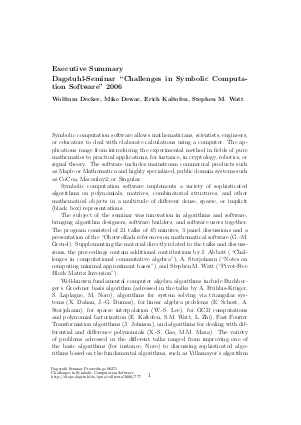06271 Executive Summary - Challenges in Symbolic Computation Software
Authors Wolfram Decker, Mike Dewar, Erich Kaltofen, Stephen M. Watt
-
Part of:
Volume:
Dagstuhl Seminar Proceedings, Volume 6271
Part of: Series: Dagstuhl Seminar Proceedings (DagSemProc) - License:
 Creative Commons Attribution 4.0 International license
Creative Commons Attribution 4.0 International license
- Publication Date: 2006-10-25
File

PDF
DagSemProc.06271.2.pdf
- Filesize: 56 kB
- 2 pages
Document Identifiers
Subject Classification
Keywords
- Symbolic computation
- computer algebra
- computational algebraic geometry
- combinatorial methods in algebra
- hybrid symbolic-numerical methods
- algori
Metrics
- Access Statistics
-
Total Accesses (updated on a weekly basis)
0PDF Downloads0Metadata Views
Abstract
Symbolic computation software allows mathematicians, scientists, engineers, or educators to deal with elaborate calculations using a computer. The applications range from introducing the experimental method in fields of pure mathematics to practical applications, for instance, in cryptology, robotics, or signal theory. The software includes mainstream commercial products such as Maple or Mathematica and highly specialized, public domain systems such as CoCoa, Macaulay2, or Singular. Symbolic computation software implements a variety of sophisticated algorithms on polynomials, matrices, combinatorial structures, and other mathematical objects in a multitude of different dense, sparse, or implicit (black box) representations. The subject of the seminar was innovation in algorithms and software, bringing algorithm designers, software builders, and software users together.
Cite As Get BibTex
Wolfram Decker, Mike Dewar, Erich Kaltofen, and Stephen M. Watt. 06271 Executive Summary - Challenges in Symbolic Computation Software. In Challenges in Symbolic Computation Software. Dagstuhl Seminar Proceedings, Volume 6271, pp. 1-2, Schloss Dagstuhl – Leibniz-Zentrum für Informatik (2006)
https://doi.org/10.4230/DagSemProc.06271.2
BibTex
@InProceedings{decker_et_al:DagSemProc.06271.2,
author = {Decker, Wolfram and Dewar, Mike and Kaltofen, Erich and Watt, Stephen M.},
title = {{06271 Executive Summary - Challenges in Symbolic Computation Software}},
booktitle = {Challenges in Symbolic Computation Software},
pages = {1--2},
series = {Dagstuhl Seminar Proceedings (DagSemProc)},
ISSN = {1862-4405},
year = {2006},
volume = {6271},
editor = {Wolfram Decker and Mike Dewar and Erich Kaltofen and Stephen Watt},
publisher = {Schloss Dagstuhl -- Leibniz-Zentrum f{\"u}r Informatik},
address = {Dagstuhl, Germany},
URL = {https://drops.dagstuhl.de/entities/document/10.4230/DagSemProc.06271.2},
URN = {urn:nbn:de:0030-drops-7778},
doi = {10.4230/DagSemProc.06271.2},
annote = {Keywords: Symbolic computation, computer algebra, computational algebraic geometry, combinatorial methods in algebra, hybrid symbolic-numerical methods, algori}
}
